Somalia analyst
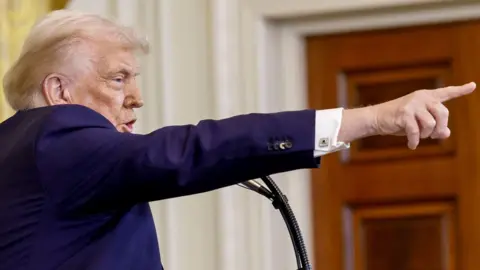 Getty Images
Getty ImagesFinding and fighting the militants who have become the beating heart of the Islamic State (IS) group in Africa can be tough work as they hide deep in the mountains of north-eastern Somalia.
But in typical Donald Trump style, after the new US president ordered an airstrike on the area last weekend, he posted on social media: “WE WILL FIND YOU, AND WE WILL KILL YOU!”
Trump said the hit, less than two weeks into his term, had targeted a senior IS attack planner and other militants in Somalia’s semi-autonomous region of Puntland and had “destroyed the caves they live in, and killed many terrorists without, in any way, harming civilians”.
He boasted that he had succeeded where former US President Joe Biden had failed.
“Biden and his cronies wouldn’t act quickly enough to get the job done. I did!”
The fact that Somalia was the target of America’s first major military operation under the new administration surprised many in the country who feared the US was planning to abandon them.
In his first term, Trump withdrew about 700 American troops, a decision reversed by his successor.
The $600,000 (£492,000) a year deal the Somalia government recently signed with top Washington lobbying firm, the BGR Group, is an indication of how worried it is.
Under Biden, US troops in Somalia were carrying out special operations, training an elite Somali force and conducting regular airstrikes.
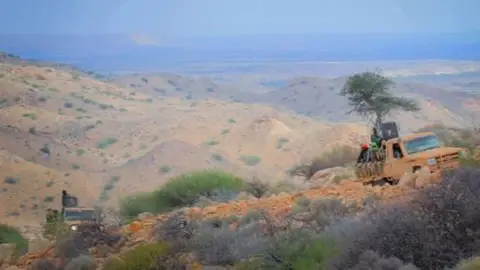 @PuntlandSSR
@PuntlandSSRA day before the airstrike, the Washington Post published an interview with Somali President Hassan Sheikh Mohamud in which he pleaded for the US “not to pull out the American advisers and consultants who are supporting the training of our special forces”.
A post on X from his office after the strike also had a touch of desperation about it, acknowledging “the unwavering support of the United States in the fight against international terrorism” and welcoming “the continued commitment under the decisive leadership of President Donald Trump”.
But airstrikes are different from troops on the ground and Trump did not stop aerial bombardments in his first term. In fact, he increased them to nearly 400.
“The strike does not mean that the US government is going to step up its military engagement in Somalia,” says Matt Bryden, the strategic adviser of Nairobi-based Sahan Research.
“Several American officials expected to assume leadership positions on African affairs no longer perceive Somalia’s federal government to be a credible partner and are deeply critical of the high levels of security assistance provided in recent years to very little appreciable effect.”
Puntland’s counter-terrorism approach is different from that of the national Somali government, with which it cut ties in March last year.
It is more self-reliant and not as heavily dependent on support from African Union troops – of which around 12,000 are on the ground – and global powers including the US and Turkey.
As Mohamed Mubarak, head of Puntland’s security co-ordination office, points out it is troops from the north-east that have been battling IS for years with little help or thanks from others.
“It is not fair to put the airstrike front and centre while we have been fighting and dying on the ground,” Mr Mubarak says.
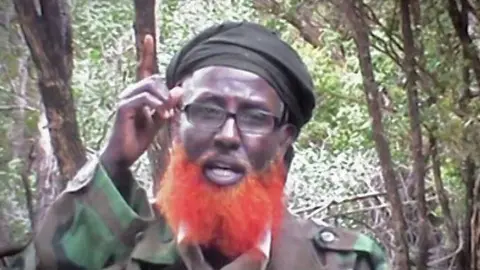 al-kataib
al-kataib“Regardless of what the rest of the world is doing, we are fighting IS, which is an international problem,” he says.
“We have not seen much support except from Kenya, Ethiopia and the UAE. We don’t know if the Americans will conduct more than one airstrike.”
Puntland says its forces have captured 48 caves and IS outposts – and destroyed dozens of drones and explosive devices – since launching its full-scale “hilaac” or “lightning” offensive last year.
Although IS has been active in Somalia for about a decade, it has posed less of a threat than the Islamist group al-Shabab, which controls large parts of the country and has been described as al-Qaeda’s most successful affiliate.
However, in recent times, IS has become more significant – locally, regionally and internationally.
The authorities in Puntland and unnamed US officials say IS-Somalia’s leader, the orange-bearded, bespectacled Abdulqadir Mumin, is now the global head of IS.
Initial reports suggested he had been killed in a US airstrike last May but have never been confirmed.
Whether or not Mumin is the head of IS or is alive or dead, IS-Somalia has become increasingly worrying for foreign states.
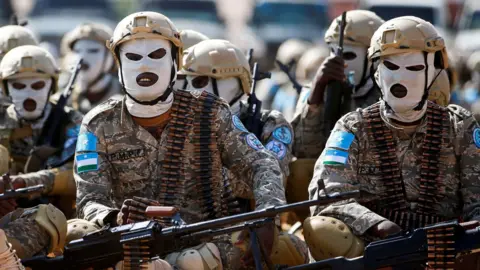 Reuters
ReutersAs Trump said: “These killers, who we found hiding in caves, threatened the United States and our allies.”
According to Tricia Bacon, director of the policy anti-terrorism hub at American University in Washington DC, “IS-Somalia has taken on more responsibilities within the Islamic State network, particularly in Africa but beyond the continent as well”.
With branches of IS operating across the continent, from Mozambique to Mali, from the Democratic Republic of Congo to Nigeria, IS-Somalia serves as a crucial nerve centre.
Ms Bacon warns that IS-Somalia is looking beyond Africa too.
“It is positioned to facilitate and contribute to IS attacks in the West, including the United States. It also seeks to inspire attacks in the West,” she says.
“International partners should provide more support to Puntland’s ongoing efforts against the group.”
Mr Bryden says collusion with Iranian-backed Houthi rebels across the Red Sea in Yemen is also an issue.
“Like al-Shabab, IS-Somalia has received arms and training from the Houthis in Yemen, which is a source of concern for the US government and its allies,” he says.
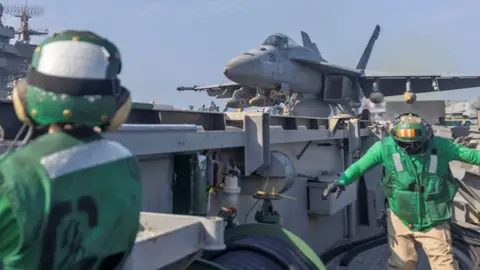 @USAfricaCommand
@USAfricaCommandA growing number of foreign fighters are joining the group, enhancing its strength in terms of numbers and expertise.
A major source of IS-Somalia recruits are thought to be Ethiopian migrants, who gather in Puntland’s port city of Bosaso in the hope of a sea crossing to a better life abroad.
IS offers them better pay than they would earn in the Gulf states and experts say that some of the group’s senior commanders are Ethiopian.
“We assess that IS-Somalia is 80% or more foreign fighters, mostly from North Africa, Ethiopia, Tanzania and the Middle East, in that order,” says Mr Mubarak.
He estimates the group is about 1,000-strong; UN monitors put it at around 600 to 700.
Last October, the head of the US Africa Command, Michael Langley, said he thought IS had grown in northern Somalia by about “two-fold” in a year.
The group staged one of its most sophisticated ever attacks in December, hitting a military base in Puntland’s Bari region.
The group released a statement saying not a single Somali was involved. The 12 attackers came from seven countries – Tanzania, Algeria, Morocco, Libya, Tunisia, Yemen and Ethiopia.
The movement has also become more effective at raising money.
The US, UN and Somalia experts say a key part of IS’s financial infrastructure – the al-Karrar office – is based in Puntland, disbursing funds and expertise to other branches of the group in Africa and beyond.
The US Treasury’s Office of Foreign Assets Control (OFAC) said IS-Somalia had raised nearly $2m in the first half of 2022 by taxing local businesses, imports, nomads and farmers.
If Puntland’s forces are to succeed in driving out the militants, air support will prove invaluable.
Shortly after the US strike, Puntland police said the head of IS-Somalia’s assassination squad, Abdirahman Shirwa Aw-Said, had surrendered.
But experts say such strikes will need to be consistent to hunt down existing IS cells in Somalia and stop others mushrooming.
It is unclear whether the US and its unpredictable leader have the appetite to keep bombing Somalia’s north-eastern mountains.
Mary Harper has written two books about Somalia, including Everything You Have Told Me Is True, a look at life under al-Shabab.
You may also be interested in:
 Getty Images/BBC
Getty Images/BBC






